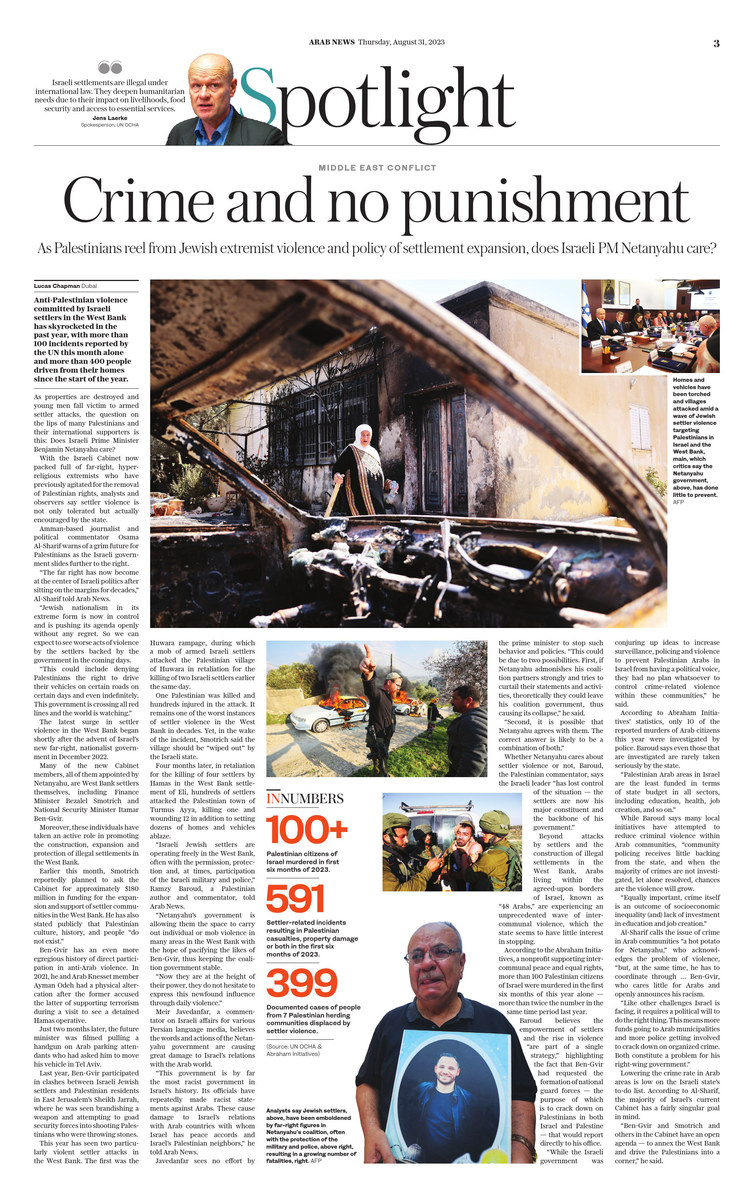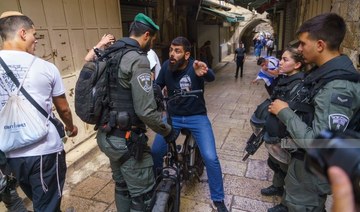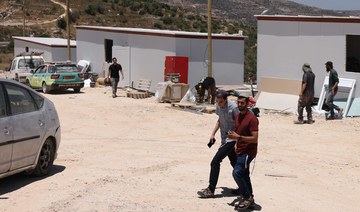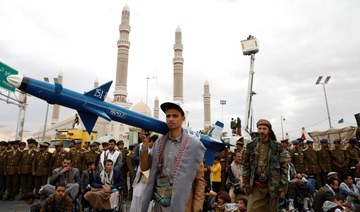DUBAI: Anti-Palestinian violence committed by Israeli settlers in the West Bank has skyrocketed in the past year, with more than 100 incidents reported by the UN this month alone and more than 400 people driven from their homes since the start of the year.
As properties are destroyed and young men fall victim to armed settler attacks, the question on the lips of many Palestinians and their international supporters is this: Does Israeli Prime Minister Benjamin Netanyahu care?
With the Israeli Cabinet now packed full of far-right, hyper-religious politicians who have previously agitated for the removal of Palestinian rights, analysts and observers say settler violence is not only tolerated but actually encouraged by the state.

Settler aggression against Palestinians in the West Bank has been encouraged by the government of Israeli Prime Minister Benjamin Netanyahu, who has packed his Cabinet with Jewish extremists, critics say. (AFP)
Amman-based journalist and political commentator Osama Al-Sharif warns of a grim future for Palestinians as the Israeli government slides further to the right.
“The far right has now become at the center of Israeli politics after sitting on the margins for decades,” Al-Sharif told Arab News.
“Jewish nationalism in its extreme form is now in control and is pushing its agenda openly without any regret. So, we can expect to see worse acts of violence by the settlers backed by the government in the coming days.
“This could include denying Palestinians the right to drive their vehicles on certain roads on certain days and even indefinitely. This government is crossing all red lines and the world is watching.”
The latest surge in settler violence in the West Bank began shortly after the advent of Israel’s new far-right, nationalist government in December 2022.
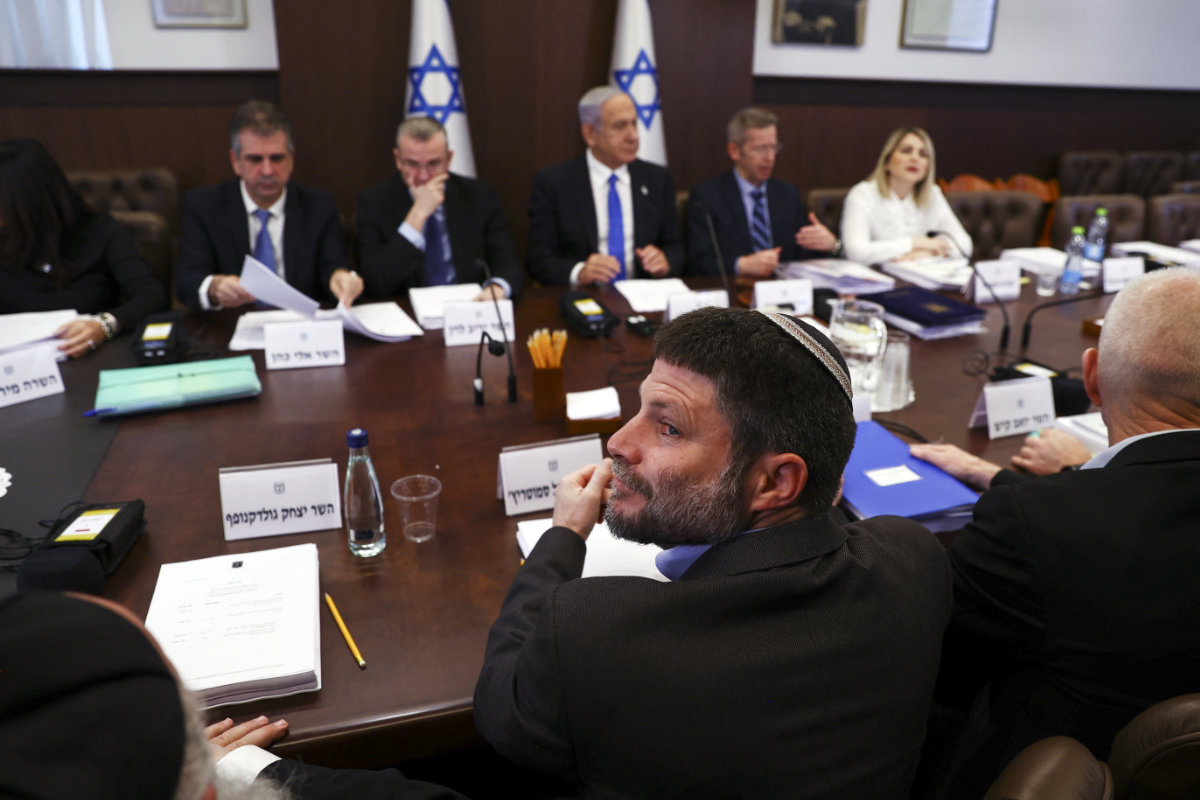
Aside from stating publicly that Palestinian culture, history, and people “do not exist,” Israeli Finance Minister Bezalel Smotrich (C) has had been promoting the construction, expansion and protection of illegal settlements in the West Bank. (Pool/AFP)
Many of the new Cabinet members, all of them appointed by Netanyahu, are West Bank settlers themselves, including Finance Minister Bezalel Smotrich and National Security Minister Itamar Ben-Gvir.
Moreover, these individuals have taken an active role in promoting the construction, expansion and protection of illegal settlements in the West Bank.
Earlier this month, Smotrich reportedly planned to ask the Cabinet for approximately $180 million in funding for the expansion and support of settler communities in the West Bank. He has also stated publicly that Palestinian culture, history, and people “do not exist.”
Ben-Gvir has an even more egregious history of direct participation in anti-Arab violence. In 2021, he and Arab Knesset member Ayman Odeh had a physical altercation after the former accused the latter of supporting terrorism during a visit to see a detained Hamas operative.
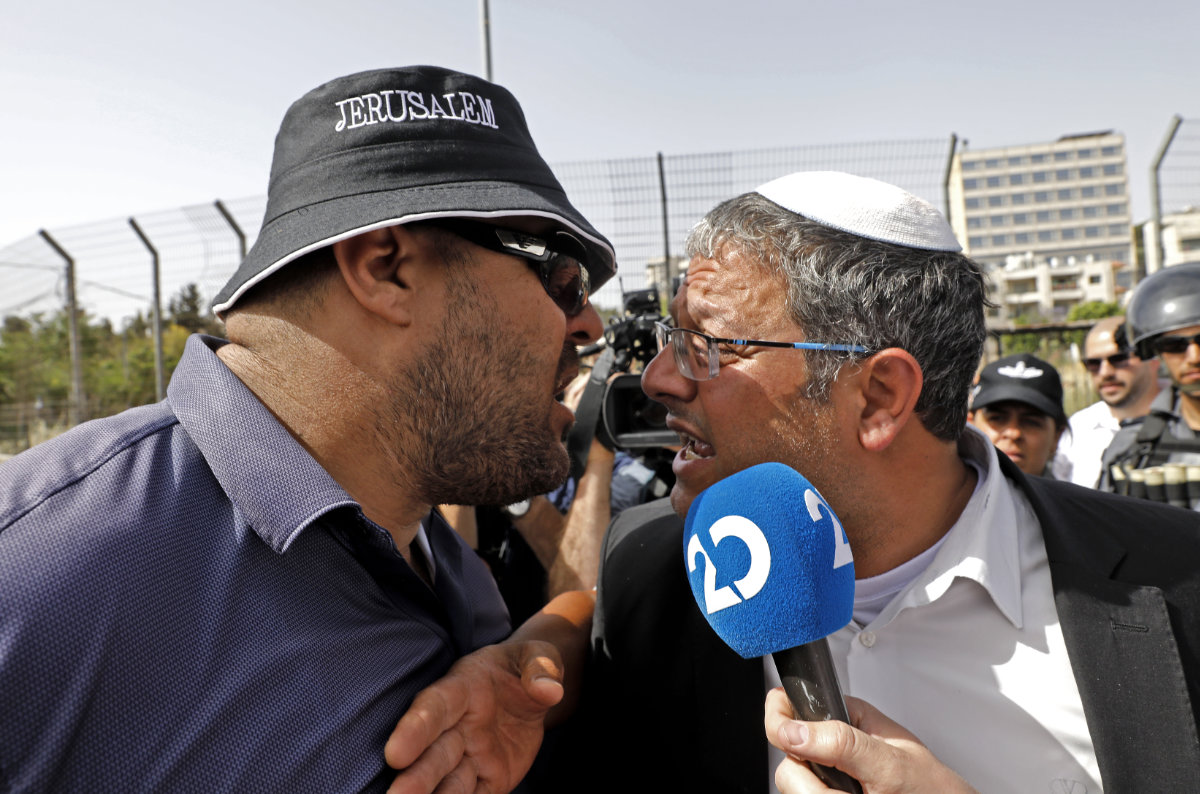
Knesset member and head of the far right Jewish Power (Otzma Yehudit) party Itamar Ben-Gvir argues with a Palestinian man in the Sheikh Jarrah neighbourhood of the Israeli-annexed east Jerusalem on May 10, 2021. (AFP)
Just two months later, the future minister was filmed pulling a handgun on Arab parking attendants who had asked him to move his vehicle in Tel Aviv.
Last year, Ben-Gvir participated in clashes between Israeli Jewish settlers and Palestinian residents in East Jerusalem’s Sheikh Jarrah, where he was seen brandishing a weapon and attempting to goad security forces into shooting Palestinians who were throwing stones.
This year has seen two particularly violent settler attacks in the West Bank. The first was the Huwara rampage, during which a mob of armed Israeli settlers attacked the Palestinian village of Huwara in retaliation for the killing of two Israeli settlers earlier the same day.
One Palestinian was killed and hundreds injured in the attack. It remains one of the worst instances of settler violence in the West Bank in decades. Yet, in the wake of the incident, Smotrich said the village should be “wiped out” by the Israeli state.
Four months later, in retaliation for the killing of four settlers by Hamas in the West Bank settlement of Eli, hundreds of settlers attacked the Palestinian town of Turmus Ayya, killing one and wounding 12 in addition to setting dozens of homes and vehicles ablaze.
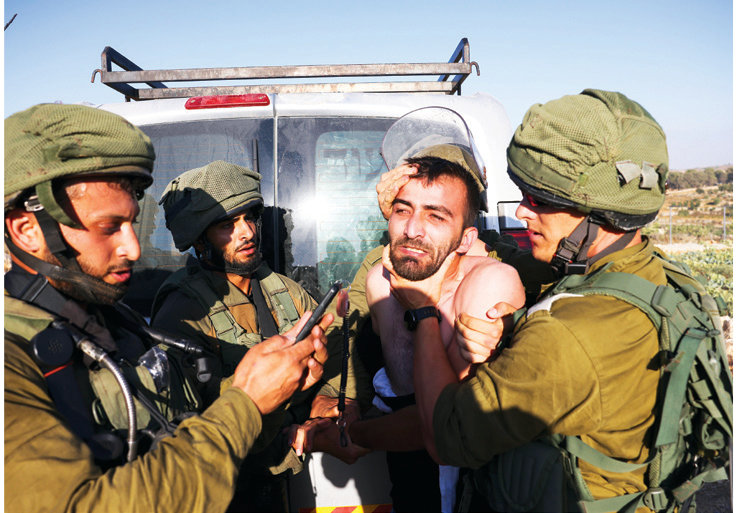
Israeli soldiers have been accused of abetting Jewish settler land-grabs by restraining Palestinian when they try to protect their lands. (AFP/File)
“Israeli Jewish settlers are operating freely in the West Bank, often with the permission, protection and, at times, participation of the Israeli military and police,” Ramzy Baroud, a Palestinian author and commentator, told Arab News.
“Netanyahu’s government is allowing them the space to carry out individual or mob violence in many areas in the West Bank with the hope of pacifying the likes of Ben-Gvir, thus keeping the coalition government stable.
“Now they are at the height of their power, they do not hesitate to express this newfound influence through daily violence.”
INNUMBERS
100+ Palestinian citizens of Israel murdered in first six months of 2023.
591 Settler-related incidents resulting in Palestinian casualties, property damage or both in the first six months of 2023.
399 Documented cases of people from 7 Palestinian herding communities displaced by settler violence.
(Source: UN OCHA & Abraham Initiatives)
Meir Javedanfar, a commentator on Israeli affairs for various Persian language media, believes the words and actions of the Netanyahu government are causing great damage to Israel’s relations with the Arab world.
“This government is by far the most racist government in Israel’s history. Its officials have repeatedly made racist statements against Arabs. These cause damage to Israel’s relations with Arab countries with whom Israel has peace accords and Israel’s Palestinian neighbors,” he told Arab News.
“Violence by extremist settlers against Palestinians have further increased tensions. Things could get worse as the government has stated that it has plans to significantly expand settlements in the West Bank.”
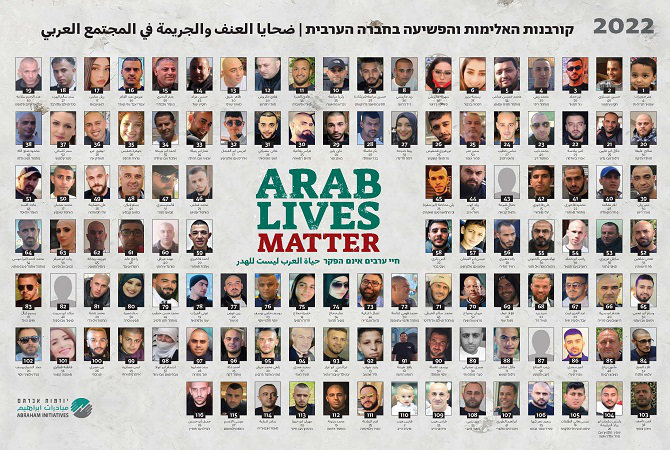
Abraham Initiatives infographic
Javedanfar sees no effort by the prime minister to stop such behavior and policies. “This could be due to two possibilities. First, if Netanyahu admonishes his coalition partners strongly and tries to curtail their statements and activities, theoretically they could leave his coalition government, thus causing its collapse,” he said.
“Second, it is possible that Netanyahu agrees with them. The correct answer is likely to be a combination of both.”
Whether Netanyahu cares about settler violence or not, Baroud, the Palestinian commentator, says the Israeli leader “has lost control of the situation — the settlers are now his major constituent and the backbone of his government.”
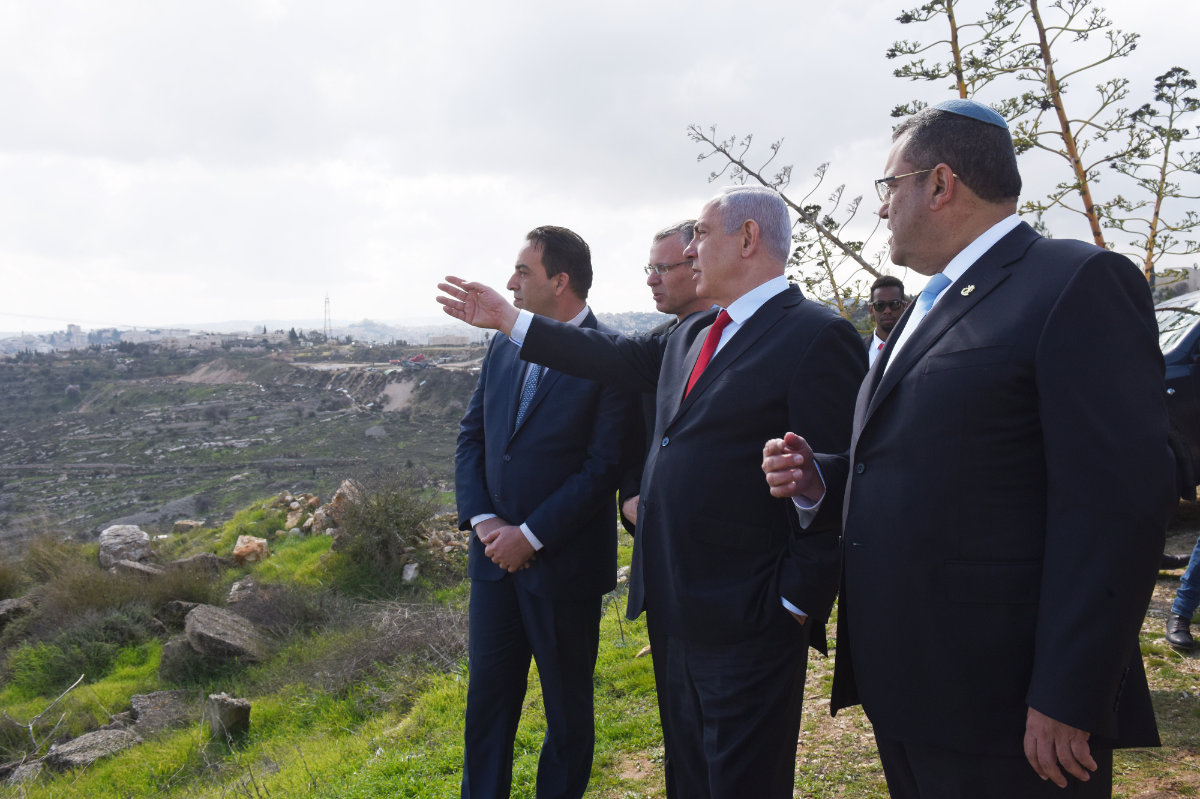
Israeli Prime Minister Benjamin Netanyahu points from an overview at the Israeli settlement of Har Homa (background) on February 20, 2020, during which he announced plans to build thousands of new homes for Jewish settlers in annexed east Jerusalem. AFP/File)
Beyond attacks by settlers and the construction of illegal settlements in the West Bank, Arabs living within the agreed-upon borders of Israel, known as “48 Arabs,” are experiencing an unprecedented wave of inter-communal violence, which the state seems to have little interest in stopping.
According to the Abraham Initiatives, a non-profit supporting inter-communal peace and equal rights, more than 100 Palestinian citizens of Israel were murdered in the first six months of this year alone — more than twice the number in the same time period last year.
Baroud believes the empowerment of settlers and the rise in violence “are part of a single strategy,” highlighting the fact that Ben-Gvir had requested the formation of national guard forces — the purpose of which is to crack down on Palestinians in both Israel and Palestine — that would report directly to his office.
“While the Israeli government was conjuring up ideas to increase surveillance, policing and violence to prevent Palestinian Arabs in Israel from having a political voice, they had no plan whatsoever to control crime-related violence within these communities,” he said.
According to Abraham Initiatives’ statistics, only 10 of the reported murders of Arab citizens this year were investigated by police. Baroud says even those that are investigated are rarely taken seriously by the state.
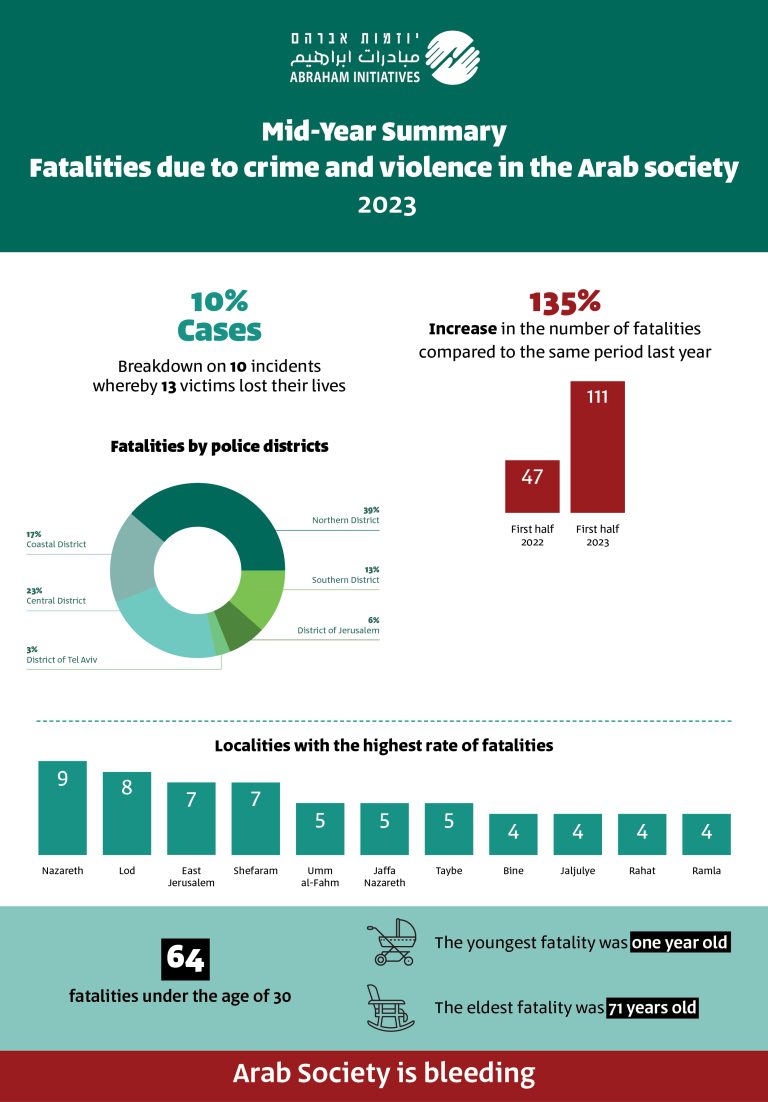
Abraham Initiatives infographic
“Palestinian Arab areas in Israel are the least funded in terms of state budget in all sectors, including education, health, job creation, and so on.”
While Baroud says many local initiatives have attempted to reduce criminal violence within Arab communities, “community policing receives little backing from the state, and when the majority of crimes are not investigated, let alone resolved, chances are the violence will grow.
“Equally important, crime itself is an outcome of socioeconomic inequality (and) lack of investment in education and job creation.”
Al-Sharif calls the issue of crime in Arab communities “a hot potato for Netanyahu,” who acknowledges the problem of violence, “but, at the same time, he has to coordinate through … Ben-Gvir, who cares little for Arabs and openly announces his racism.
“Like other challenges Israel is facing, it requires a political will to do the right thing. This means more funds going to Arab municipalities and more police getting involved to crack down on organized crime. Both constitute a problem for his right-wing government.”
Lowering the crime rate in Arab areas is low on the Israeli state’s to-do list. According to Al-Sharif, the majority of Israel’s current Cabinet has a fairly singular goal in mind.
“Ben-Gvir and Smotrich and others in the Cabinet have an open agenda — to annex the West Bank and drive the Palestinians into a corner,” he said.
